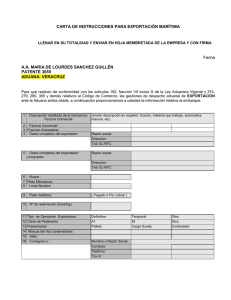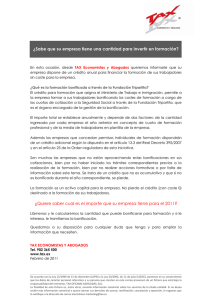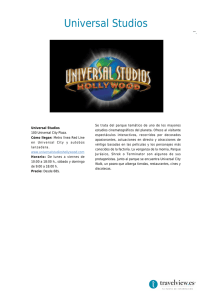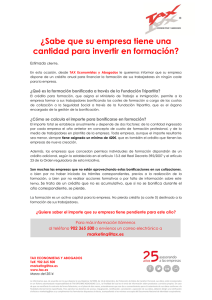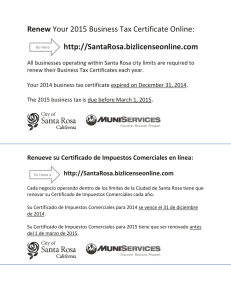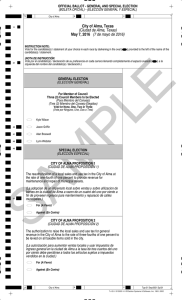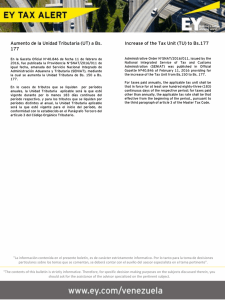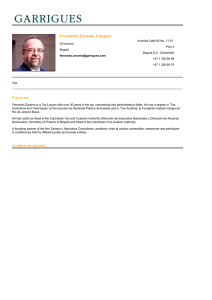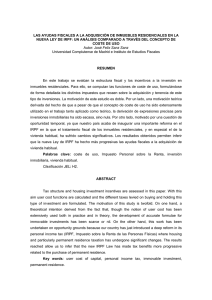Ê58501lŠ - Yuba County
Anuncio
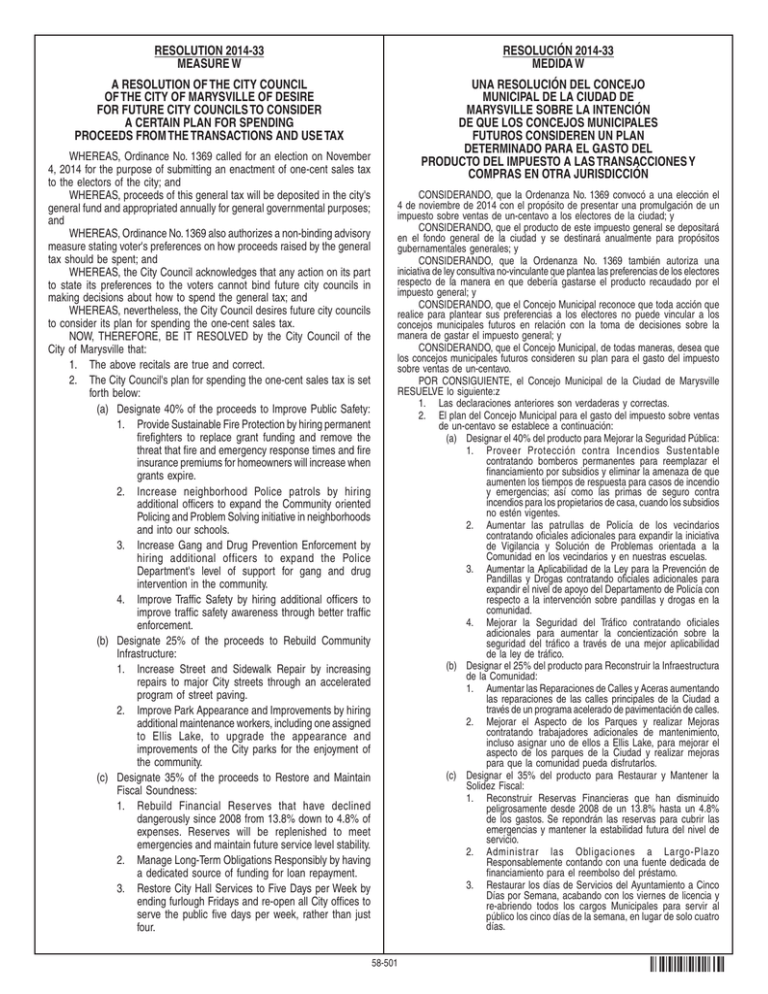
RESOLUTION 2014-33
MEASURE W
RESOLUCIÓN 2014-33
MEDIDA W
A RESOLUTION OF THE CITY COUNCIL
OF THE CITY OF MARYSVILLE OF DESIRE
FOR FUTURE CITY COUNCILS TO CONSIDER
A CERTAIN PLAN FOR SPENDING
PROCEEDS FROM THE TRANSACTIONS AND USE TAX
UNA RESOLUCIÓN DEL CONCEJO
MUNICIPAL DE LA CIUDAD DE
MARYSVILLE SOBRE LA INTENCIÓN
DE QUE LOS CONCEJOS MUNICIPALES
FUTUROS CONSIDEREN UN PLAN
DETERMINADO PARA EL GASTO DEL
PRODUCTO DEL IMPUESTO A LAS TRANSACCIONES Y
COMPRAS EN OTRA JURISDICCIÓN
WHEREAS, Ordinance No. 1369 called for an election on November
4, 2014 for the purpose of submitting an enactment of one-cent sales tax
to the electors of the city; and
WHEREAS, proceeds of this general tax will be deposited in the city's
general fund and appropriated annually for general governmental purposes;
and
WHEREAS, Ordinance No. 1369 also authorizes a non-binding advisory
measure stating voter's preferences on how proceeds raised by the general
tax should be spent; and
WHEREAS, the City Council acknowledges that any action on its part
to state its preferences to the voters cannot bind future city councils in
making decisions about how to spend the general tax; and
WHEREAS, nevertheless, the City Council desires future city councils
to consider its plan for spending the one-cent sales tax.
NOW, THEREFORE, BE IT RESOLVED by the City Council of the
City of Marysville that:
1. The above recitals are true and correct.
2. The City Council's plan for spending the one-cent sales tax is set
forth below:
(a) Designate 40% of the proceeds to Improve Public Safety:
1. Provide Sustainable Fire Protection by hiring permanent
firefighters to replace grant funding and remove the
threat that fire and emergency response times and fire
insurance premiums for homeowners will increase when
grants expire.
2. Increase neighborhood Police patrols by hiring
additional officers to expand the Community oriented
Policing and Problem Solving initiative in neighborhoods
and into our schools.
3. Increase Gang and Drug Prevention Enforcement by
hiring additional officers to expand the Police
Department's level of support for gang and drug
intervention in the community.
4. Improve Traffic Safety by hiring additional officers to
improve traffic safety awareness through better traffic
enforcement.
(b) Designate 25% of the proceeds to Rebuild Community
Infrastructure:
1. Increase Street and Sidewalk Repair by increasing
repairs to major City streets through an accelerated
program of street paving.
2. Improve Park Appearance and Improvements by hiring
additional maintenance workers, including one assigned
to Ellis Lake, to upgrade the appearance and
improvements of the City parks for the enjoyment of
the community.
(c) Designate 35% of the proceeds to Restore and Maintain
Fiscal Soundness:
1. Rebuild Financial Reserves that have declined
dangerously since 2008 from 13.8% down to 4.8% of
expenses. Reserves will be replenished to meet
emergencies and maintain future service level stability.
2. Manage Long-Term Obligations Responsibly by having
a dedicated source of funding for loan repayment.
3. Restore City Hall Services to Five Days per Week by
ending furlough Fridays and re-open all City offices to
serve the public five days per week, rather than just
four.
CONSIDERANDO, que la Ordenanza No. 1369 convocó a una elección el
4 de noviembre de 2014 con el propósito de presentar una promulgación de un
impuesto sobre ventas de un-centavo a los electores de la ciudad; y
CONSIDERANDO, que el producto de este impuesto general se depositará
en el fondo general de la ciudad y se destinará anualmente para propósitos
gubernamentales generales; y
CONSIDERANDO, que la Ordenanza No. 1369 también autoriza una
iniciativa de ley consultiva no-vinculante que plantea las preferencias de los electores
respecto de la manera en que debería gastarse el producto recaudado por el
impuesto general; y
CONSIDERANDO, que el Concejo Municipal reconoce que toda acción que
realice para plantear sus preferencias a los electores no puede vincular a los
concejos municipales futuros en relación con la toma de decisiones sobre la
manera de gastar el impuesto general; y
CONSIDERANDO, que el Concejo Municipal, de todas maneras, desea que
los concejos municipales futuros consideren su plan para el gasto del impuesto
sobre ventas de un-centavo.
POR CONSIGUIENTE, el Concejo Municipal de la Ciudad de Marysville
RESUELVE lo siguiente:z
1. Las declaraciones anteriores son verdaderas y correctas.
2. El plan del Concejo Municipal para el gasto del impuesto sobre ventas
de un-centavo se establece a continuación:
(a) Designar el 40% del producto para Mejorar la Seguridad Pública:
1. Proveer Protección contra Incendios Sustentable
contratando bomberos permanentes para reemplazar el
financiamiento por subsidios y eliminar la amenaza de que
aumenten los tiempos de respuesta para casos de incendio
y emergencias; así como las primas de seguro contra
incendios para los propietarios de casa, cuando los subsidios
no estén vigentes.
2. Aumentar las patrullas de Policía de los vecindarios
contratando oficiales adicionales para expandir la iniciativa
de Vigilancia y Solución de Problemas orientada a la
Comunidad en los vecindarios y en nuestras escuelas.
3. Aumentar la Aplicabilidad de la Ley para la Prevención de
Pandillas y Drogas contratando oficiales adicionales para
expandir el nivel de apoyo del Departamento de Policía con
respecto a la intervención sobre pandillas y drogas en la
comunidad.
4. Mejorar la Seguridad del Tráfico contratando oficiales
adicionales para aumentar la concientización sobre la
seguridad del tráfico a través de una mejor aplicabilidad
de la ley de tráfico.
(b) Designar el 25% del producto para Reconstruir la Infraestructura
de la Comunidad:
1. Aumentar las Reparaciones de Calles y Aceras aumentando
las reparaciones de las calles principales de la Ciudad a
través de un programa acelerado de pavimentación de calles.
2. Mejorar el Aspecto de los Parques y realizar Mejoras
contratando trabajadores adicionales de mantenimiento,
incluso asignar uno de ellos a Ellis Lake, para mejorar el
aspecto de los parques de la Ciudad y realizar mejoras
para que la comunidad pueda disfrutarlos.
(c) Designar el 35% del producto para Restaurar y Mantener la
Solidez Fiscal:
1. Reconstruir Reservas Financieras que han disminuido
peligrosamente desde 2008 de un 13.8% hasta un 4.8%
de los gastos. Se repondrán las reservas para cubrir las
emergencias y mantener la estabilidad futura del nivel de
servicio.
2. Administrar las Obligaciones a Largo-Plazo
Responsablemente contando con una fuente dedicada de
financiamiento para el reembolso del préstamo.
3. Restaurar los días de Servicios del Ayuntamiento a Cinco
Días por Semana, acabando con los viernes de licencia y
re-abriendo todos los cargos Municipales para servir al
público los cinco días de la semana, en lugar de solo cuatro
días.
58-501
Ê58501lŠ
ORDINANCE 1369
MEASURE W
AN ORDINANCE OF THE CITY OF MARYSVILLE
IMPOSING A TRANSACTIONS AND USE TAX TO BE
ADMINISTERED BY THE STATE BOARD OF EQUALIZATION
The City Council of the City of Marysville, State of California, does
ordain as follows:
SECTION 1. A new Chapter 3.05 entitled "Transactions and Use Tax" of
Title 3 entitled "Revenue and Finance" of the Marysville Municipal Code
is hereby added as follows:
3.05.010. TITLE. This ordinance shall be known as the City of Marysville
Transactions and Use Tax Ordinance. The city of Marysville hereinafter shall
be called "City." This ordinance shall be applicable in the incorporated
territory of the City.
SECTION 2. 3.05.020. OPERATIVE DATE. "Operative Date" means the
first day of the first calendar quarter commencing more than 110 days after
the adoption of this ordinance, the date of such adoption being as set forth
below.
SECTION 3. 3.05.030. PURPOSE. This ordinance is adopted to achieve
the following, among other purposes, and directs that the provisions hereof
be interpreted in order to accomplish those purposes:
A.
To impose a retail transactions and use tax in accordance
with the provisions of Part 1.6 (commencing with Section 7251) of Division
2 of the Revenue and Taxation Code and Section 7285.9 of Part 1.7 of
Division 2 which authorizes the City to adopt this tax ordinance which shall
be operative if a majority of the electors voting on the measure vote to
approve the imposition of the tax at an election called for that purpose.
B.
To adopt a retail transactions and use tax ordinance that
incorporates provisions identical to those of the Sales and Use Tax Law
of the State of California insofar as those provisions are not inconsistent
with the requirements and limitations contained in Part 1.6 of Division 2 of
the Revenue and Taxation Code.
C.
To adopt a retail transactions and use tax ordinance that
imposes a tax and provides a measure therefore that can be administered
and collected by the State Board of Equalization in a manner that adapts
itself as fully as practicable to, and requires the least possible deviation
from, the existing statutory and administrative procedures followed by the
State Board of Equalization in administering and collecting the California
State Sales and Use Taxes.
D.
To adopt a retail transactions and use tax ordinance that can
be administered in a manner that will be, to the greatest degree possible,
consistent with the provisions of Part 1.6 of Division 2 of the Revenue and
Taxation Code, minimize the cost of collecting the transactions and use
taxes, and at the same time, minimize the burden of record keeping upon
persons subject to taxation under the provisions of this ordinance.
SECTION 4. 3.05.040. CONTRACT WITH STATE. Prior to the operative
date, the City shall contract with the State Board of Equalization to perform
all functions incident to the administration and operation of this transactions
and use tax ordinance; provided, that if the City shall not have contracted
with the State Board of Equalization prior to the operative date, it shall
nevertheless so contract and in such a case the operative date shall be
the first day of the first calendar quarter following the execution of such a
contract.
SECTION 5. 3.05.050 TRANSACTIONS TAX RATE. For the privilege of
selling tangible personal property at retail, a tax is hereby imposed upon
all retailers in the incorporated territory of the City at the rate of one percent
(1.0%) of the gross receipts of any retailer from the sale of all tangible
personal property sold at retail in said territory on and after the operative
date of this ordinance.
SECTION 6. 3.05.060 PLACE OF SALE. For the purposes of this
ordinance, all retail sales are consummated at the place of business of the
retailer unless the tangible personal property sold is delivered by the retailer
or his agent to an out-of-state destination or to a common carrier for delivery
to an out-of-state destination. The gross receipts from such sales shall
include delivery charges, when such charges are subject to the state sales
and use tax, regardless of the place to which delivery is made. In the event
a retailer has no permanent place of business in the State or has more
than one place of business, the place or places at which the retail sales
are consummated shall be determined under rules and regulations to be
prescribed and adopted by the State Board of Equalization.
SECTION 7. 3.05.070 USE TAX RATE. An excise tax is hereby imposed
ORDENANZA 1369
MEDIDA W
UNA ORDENANZA DE LA CIUDAD DE MARYSVILLE QUE
IMPONE UN IMPUESTO A LAS TRANSACCIONES Y
COMPRAS EN OTRA JURISDICCIÓN A SER ADMINISTRADO
POR LA JUNTA DIRECTIVA ESTATAL DE IMPUESTOS
SOBRE VENTAS
El Concejo Municipal de la Ciudad de Marysville, Estado de California,
ordena lo siguiente:
SECCIÓN 1. Se agrega por medio de la presente un nuevo Capítulo
3.05 denominado "Impuesto a las Transacciones y Compras en Otra
Jurisdicción" del Título 3 denominado "Rentas y Finanzas" del Código
Municipal de Marysville de la siguiente manera:
3.5.10. TÍTULO. Esta ordenanza se conocerá como la Ordenanza del
Impuesto a las Transacciones y Compras en Otra Jurisdicción de la Ciudad
de Marysville. La ciudad de Marysville en adelante se denominará "Ciudad."
Esta ordenanza se aplicará al territorio incorporado de la Ciudad.
SECCIÓN 2. 3.05.020. FECHA DE ENTRADA EN VIGOR. "Fecha de
Entrada en Vigor" significa el primer día del primer trimestre calendario
que comienza más de 110 días después de la adopción de esta ordenanza,
siendo la fecha de dicha adopción la que se establece a continuación.
SECCIÓN 3. 3.05.030. PROPÓSITO. Esta ordenanza se adopta para
alcanzar los siguientes propósitos, entre otros, y ordenar que las
disposiciones del presente sean interpretadas para cumplir dichos
propósitos:
A.
Imponer un impuesto a las transacciones y compras en otra
jurisdicción sobre venta minorista en conformidad con las disposiciones
de la Parte 1.6 (comenzando con la Sección 7251) de la División 2 del
Código de Renta e Impuestos y la Sección 7285.9 de la Parte 1.7 de la
División 2 que autoriza a la Ciudad a adoptar esta ordenanza de impuesto
que entrará en vigor si una mayoría de los electores que votan por la
iniciativa de ley votan para aprobar la imposición del impuesto en una
elección convocada a tal propósito.
B.
Adoptar una ordenanza de impuesto a las transacciones y
compras en otra jurisdicción sobre venta minorista que incorpore
disposiciones idénticas a las de la Ley de Impuestos sobre las Ventas y
Compras en Otra Jurisdicción del Estado de California en la medida que
dichas disposiciones no sean inconsistentes con los requisitos y las
limitaciones contenidas en la Parte 1.6 de la División 2 del Código de
Renta e Impuestos.
C.
Adoptar una ordenanza de impuesto a las transacciones y
compras en otra jurisdicción sobre venta minorista que imponga un impuesto
y disponga una iniciativa de ley en consecuencia que pueda ser administrado
y recaudado por la Junta Directiva Estatal de Impuestos Sobre Ventas en
una manera que se adapte lo más posible y requiera la menor desviación
posible de los procedimientos estatutarios y administrativos seguidos por
la Junta Directiva Estatal de Impuestos Sobre Ventas en la administración
y la recaudación de Impuestos sobre las Ventas y Compras en Otra
Jurisdicción del Estado de California.
D.
Adoptar una ordenanza de impuesto a las transacciones y
compras en otra jurisdicción sobre venta minorista que se pueda administrar
de una manera que sea consistente, en la mayor medida de lo posible,
con las disposiciones de la Parte 1.6 de la División 2 del Código de Renta
e Impuestos, minimizar el costo de la recaudación de los impuestos a las
transacciones y compras en otra jurisdicción y, al mismo tiempo, minimizar
la carga del registro de datos de personas sujetas a impuestos de acuerdo
con las disposiciones de esta ordenanza.
SECCIÓN 4. 3.05.040. CONTRATO CON EL ESTADO. Antes de la fecha
de entrada en vigor, la Ciudad firmará un contrato con la Junta Directiva
Estatal de Impuestos Sobre Ventas para realizar todas las funciones
inherentes a la administración y operación de esta ordenanza de impuesto
a las transacciones y compras en otra jurisdicción; siempre que, si la
Ciudad no hubiera firmado un contrato con la Junta Directiva Estatal de
Impuestos Sobre Ventas antes de la fecha de entrada en vigor, de ninguna
manera firmará un contrato y en ese caso la fecha de entrada en vigor
será el primer día del primer trimestre calendario siguiente a la ejecución
del contrato.
SECCIÓN 5. 3.05.050 TASA IMPOSITIVA DE LAS TRANSACCIONES.
Por el privilegio de vender bienes personales tangibles en venta minorista,
por el presente se impone un impuesto a todos los vendedores minoristas
en el territorio incorporado de la Ciudad a una tasa del uno por ciento
(1.0%) de los ingresos brutos de cualquier vendedor minorista de la venta
58-502
Ê58502qŠ
on the storage, use or other consumption in the City of tangible personal
property purchased from any retailer on and after the operative date of
this ordinance for storage, use or other consumption in said territory at the
rate of one percent (1.0%) of the sales price of the property. The sales
price shall include delivery charges when such charges are subject to state
sales or use tax regardless of the place to which delivery is made.
SECTION 8. 3.05.080 ADOPTION OF PROVISIONS OF STATE LAW.
Except as otherwise provided in this ordinance and except insofar as they
are inconsistent with the provisions of Part 1.6 of Division 2 of the Revenue
and Taxation Code, all of the provisions of Part 1 (commencing with Section
6001) of Division 2 of the Revenue and Taxation Code are hereby adopted
and made a part of this ordinance as though fully set forth herein.
SECTION 9. 3.05.090 LIMITATIONS ON ADOPTION OF STATE LAW
AND COLLECTION OF USE TAXES. In adopting the provisions of Part 1
of Division 2 of the Revenue and Taxation Code:
A.
Wherever the State of California is named or referred to as
the taxing agency, the name of this City shall be substituted therefore.
However, the substitution shall not be made when:
1. The word "State" is used as a part of the title of the State
Controller, State Treasurer, State Board of Control, State Board of
Equalization, State Treasury, or the Constitution of the State of California;
2. The result of that substitution would require action to be
taken by or against this City or any agency, officer, or employee thereof
rather than by or against the State Board of Equalization, in performing
the functions incident to the administration or operation of this Ordinance.
3. In those sections, including, but not necessarily limited
to sections referring to the exterior boundaries of the State of California,
where the result of the substitution would be to:
a. Provide an exemption from this tax with respect to
certain sales, storage, use or other consumption of tangible personal property
which would not otherwise be exempt from this tax while such sales, storage,
use or other consumption remain subject to tax by the State under the
provisions of Part 1 of Division 2 of the Revenue and Taxation Code, or;
b. Impose this tax with respect to certain sales, storage,
use or other consumption of tangible personal property which would not
be subject to tax by the state under the said provision of that code.
4. In Sections 6701, 6702 (except in the last sentence
thereof), 6711, 6715,6737,6797 or 6828 of the Revenue and Taxation Code.
B.
The word "City" shall be substituted for the word "State" in
the phrase "retailer engaged in business in this State" in Section 6203 and
in the definition of that phrase in Section 6203.
SECTION 10. 3.05.100 PERMIT NOT REQUIRED. If a seller's permit has
been issued to a retailer under Section 6067 of the Revenue and Taxation
Code, an additional transactor's permit shall not be required by this ordinance.
SECTION 11. 3.05.110 EXEMPTIONS AND EXCLUSIONS.
A.
There shall be excluded from the measure of the transactions
tax and the use tax the amount of any sales tax or use tax imposed by
the State of California or by any city, city and county, or county pursuant
to the Bradley-Bums Uniform Local Sales and Use Tax Law or the amount
of any state-administered transactions or use tax.
B.
There are exempted from the computation of the amount of
transactions tax the gross receipts from:
1. Sales of tangible personal property, other than fuel or
petroleum products, to operators of aircraft to be used or consumed
principally outside the county in which the sale is made and directly and
exclusively in the use of such aircraft as common carriers of persons or
property under the authority of the laws of this State, the United States,
or any foreign government.
2. Sales of property to be used outside the City which is
shipped to a point outside the City, pursuant to the contract of sale, by
delivery to such point by the retailer or his agent, or by delivery by the
retailer to a carrier for shipment to a consignee at such point. For the
purposes of this paragraph, delivery to a point outside the City shall be
satisfied:
a. With respect to vehicles (other than commercial
vehicles) subject to registration pursuant to Chapter 1 (commencing with
Section 4000) of Division 3 of the Vehicle Code, aircraft licensed in
compliance with Section 21411 of the Public Utilities Code, and
undocumented vessels registered under Division 3.5 (commencing with
Section 9840) of the Vehicle Code by registration to an out-of-City address
and by a declaration under penalty of perjury, signed by the buyer, stating
that such address is, in fact, his or her principal place of residence; and
b. With respect to commercial vehicles, by registration
to a place of business out-of-City and declaration under penalty of perjury,
de todos los bienes personales tangibles vendidos en una venta minorista
en dicho territorio en y después de la fecha de entrada en vigor de esta
ordenanza.
SECCIÓN 6. 3.05.060 LUGAR DE VENTA. A los fines de esta ordenanza,
todas las ventas minoristas se consuman en el lugar de los negocios del
vendedor minorista salvo que los bienes personales tangibles vendidos
sean entregados por el vendedor minorista o su agente a un destino fueradel-estado o a un transportista común para entrega en un destino fueradel-estado. Los ingresos brutos de dichas ventas incluirán los cargos de
entrega, cuando dichos cargos estén sujetos al impuesto estatal sobre las
ventas y compras en otra jurisdicción, independientemente del lugar donde
se hace la entrega. En el caso de que un vendedor minorista no tenga
un lugar de negocios permanente en el Estado o tuviera más de un lugar
de negocios, el lugar o los lugares en los que se consuman las ventas
minoristas serán determinados conforme a reglas y regulaciones a ser
prescritas y adoptadas por la Junta Directiva Estatal de Impuestos Sobre
Ventas.
SECCIÓN 7. 3.05.070 TASA IMPOSITIVA DEL IMPUESTO SOBRE LAS
COMPRAS EN OTRA JURISDICCIÓN. Por el presente se aplica un
impuesto indirecto al almacenamiento, uso u otro consumo en la Ciudad
de bienes personales tangibles comprados a cualquier vendedor minorista
en y después de la fecha de entrada en vigor de esta ordenanza para
almacenamiento, uso u otro consumo en dicho territorio a la tasa del uno
por ciento (1.0%) del precio de venta de los bienes. El precio de venta
incluirá los cargos de entrega cuando dichos cargos estén sujetos al
impuesto estatal sobre las ventas o compras en otra jurisdicción
independientemente del lugar en el que se haga la entrega.
SECCIÓN 8. 3.05.080 ADOPCIÓN DE DISPOSICIONES DE LA LEY
ESTATAL. Salvo que en esta ordenanza se disponga lo contrario y en la
medida en que sean inconsistentes con las disposiciones de la Parte 1.6
de la División 2 del Código de Renta e Impuestos, por el presente se
adoptan todas las disposiciones de la Parte 1 (comenzando con la Sección
6001) de la División 2 del Código de Renta e Impuestos y se hacen parte
de esta ordenanza tal como queda completamente establecido aquí.
SECCIÓN 9. 3.05.090 LIMITACIONES SOBRE LA ADOPCIÓN DE LA
LEY ESTATAL Y RECAUDACIÓN DE LOS IMPUESTOS SOBRE COMPRAS
EN OTRA JURISDICCIÓN. Al adoptar las disposiciones de la Parte 1 de
la División 2 del Código de Renta e Impuestos:
A.
Cuando el Estado de California es nombrado o se hace
referencia a él como la agencia impositiva, el nombre de esta Ciudad será
sustituido por ello. Sin embargo, la sustitución no se hará cuando:
1. La palabra "Estado" se usa como parte del título del
Contralor Estatal, el Tesorero Estatal, la Junta de Control Estatal, la Junta
Directiva Estatal de Impuestos Sobre Ventas, el Tesoro Estatal, o la
Constitución del Estado de California;
2. El resultado de esta sustitución requeriría que una acción
sea tomada por o contra esta Ciudad o cualquier agencia, funcionario, o
empleado de la misma en vez de por o en contra de la Junta Directiva
Estatal de Impuestos Sobre Ventas, al cumplir con las funciones inherentes
a la administración o la operación de esta Ordenanza.
3. En esas secciones, incluida, pero no necesariamente
limitada a secciones que se refieren a los límites exteriores del Estado de
California, donde el resultado de la sustitución sería:
a. Proveer una excepción de este impuesto con respecto
a ciertas ventas, almacenamiento, uso u otro consumo de bienes personales
tangibles que de otra manera no estarían exentos de este impuesto mientras
dichas ventas, almacenamiento, uso u otro consumo permanezcan sujetos
al impuesto por parte del Estado conforme a las disposiciones de la Parte
1 de la División 2 del Código de Renta e Impuestos, o;
b. Aplicar este impuesto con respecto a ciertas ventas,
almacenamiento, uso u otro consumo de bienes personales tangibles que
no estarían sujetos al impuesto por parte del estado conforme a dicha
disposición del código.
4. En las Secciones 6701, 6702 (salvo en la última oración
de ellos), 6711, 6715, 6737, 6797 o 6828 del Código de Renta e Impuestos.
B.
La palabra "Ciudad" será sustituida por la palabra "Estado"
en la frase "vendedor minorista que desarrolle negocios en este Estado"
en la Sección 6203 y en la definición de esa frase en la Sección 6203.
SECCIÓN 10. 3.05.100 PERMISO NO REQUERIDO. Si se ha emitido un
permiso del vendedor a un vendedor minorista conforme a la Sección 6067
del Código de Renta e Impuestos, esta ordenanza no requerirá un permiso
adicional de la contraparte.
SECCIÓN 11. 3.05.110 EXENCIONES Y EXCLUSIONES.
58-503
Ê58503vŠ
signed by the buyer, that the vehicle will be operated from that address.
3. The sale of tangible personal property if the seller is
obligated to furnish the property for a fixed price pursuant to a contract
entered into prior to the operative date of this ordinance.
4. A lease of tangible personal property which is a continuing
sale of such property, for any period of time for which the lessor is obligated
to lease the property for an amount fixed by the lease prior to the operative
date of this ordinance.
5. For the purposes of subparagraphs (3) and (4) of this
section, the sale or lease of tangible personal property shall be deemed not
to be obligated pursuant to a contract or lease for any period of time for
which any party to the contract or lease has the unconditional right to terminate
the contract or lease upon notice, whether or not such right is exercised.
C.
There are exempted from the use tax imposed by this
ordinance, the storage, use or other consumption in this City of tangible
personal property:
1. The gross receipts from the sale of which have been
subject to a transactions tax under any state-administered transactions and
use tax ordinance.
2. Other than fuel or petroleum products purchased by
operators of aircraft and used or consumed by such operators directly and
exclusively in the use of such aircraft as common carriers of persons or
property for hire or compensation under a certificate of public convenience
and necessity issued pursuant to the laws of this State, the United States,
or any foreign government. This exemption is in addition to the exemptions
provided in Sections 6366 and 6366.1 of the Revenue and Taxation Code
of the State of California.
3. If the purchaser is obligated to purchase the property for
a fixed price pursuant to a contract entered into prior to the operative date
of this ordinance.
4. If the possession of, or the exercise of any right or power
over, the tangible personal property arises under a lease which is a continuing
purchase of such property for any period of time for which the lessee is
obligated to lease the property for an amount fixed by a lease prior to the
operative date of this ordinance.
5. For the purposes of subparagraphs (3) and (4) of this
section, storage, use, or other consumption, or possession of, or exercise
of any right or power over, tangible personal property shall be deemed not
to be obligated pursuant to a contract or lease for any period of time for
which any party to the contract or lease has the unconditional right to
terminate the contract or lease upon notice, whether or not such right is
exercised.
6. Except as provided in subparagraph (7), a retailer engaged
in business in the City shall not be required to collect use tax from the
purchaser of tangible personal property, unless the retailer ships or delivers
the property into the City or participates within the City in making the sale
of the property, including, but not limited to, soliciting or receiving the order,
either directly or indirectly, at a place of business of the retailer in the City
or through any representative, agent, canvasser, solicitor, subsidiary, or
person in the City under the authority of the retailer.
7. "A retailer engaged in business in the City" shall also
include any retailer of any of the following: vehicles subject to registration
pursuant to Chapter 1 (commencing with Section 4000) of Division 3 of
the Vehicle Code, aircraft licensed in compliance with Section 21411 of the
Public Utilities Code, or undocumented vessels registered under Division
3.5 (commencing with Section 9840) of the Vehicle Code. That retailer shall
be required to collect use tax from any purchaser who registers or licenses
the vehicle, vessel, or aircraft at an address in the City.
D.
Any person subject to use tax under this ordinance may credit
against that tax any transactions tax or reimbursement for transactions tax
paid to a district imposing, or retailer liable for a transactions tax pursuant
to Part 1.6 of Division 2 of the Revenue and Taxation Code with respect
to the sale to the person of the property the storage, use or other consumption
of which is subject to the use tax.
SECTION 12. 3.05.120 AMENDMENTS. All amendments subsequent to
the effective date of this ordinance to Part 1 of Division 2 of the Revenue
and Taxation Code relating to sales and use taxes and which are not
inconsistent with Part 1.6 and Part 1.7 of Division 2 of the Revenue and
Taxation Code, and all amendments to Part 1.6 and Part 1. 7 of Division
2 of the Revenue and Taxation Code, shall automatically become a part
of this ordinance, provided however, that no such amendment shall operate
so as to affect the rate of tax imposed by this ordinance.
SECTION 13. 3.05.130 ENJOINING COLLECTION FORBIDDEN. No
injunction or writ of mandate or other legal or equitable process shall issue
A.
Será excluido de la iniciativa de ley del impuesto a las
transacciones y compras en otra jurisdicción el monto de cualquier impuesto
a las ventas o impuesto sobre compras en otra jurisdicción aplicado por
el Estado de California o por cualquier ciudad, ciudad y condado, o condado
conforme a la Ley Bradley-Burns del Impuesto Uniforme a las Ventas
Locales y Compras en Otra Jurisdicción o el monto de cualquier impuesto
a las transacciones o compras en otra jurisdicción administrado por el
estado.
B.
Se eximen del cálculo del monto del impuesto a las
transacciones los ingresos brutos de:
1. Ventas de bienes personales tangibles, que no sean
productos de petróleo o combustible, a operadores de aeronaves a ser
usados o consumidos principalmente fuera del condado en el que se realiza
la venta y directa y exclusivamente en el uso de dicha aeronave como
transportistas comunes de personas o bienes conforme a la autoridad de
las leyes de este Estado, los Estados Unidos, o cualquier gobierno extranjero.
2. Las ventas de bienes a ser usados fuera de la Ciudad
que sean enviados a un punto fuera de la Ciudad, conforme al contrato
de venta, mediante la entrega en dicho punto por parte del vendedor
minorista o su agente, o mediante la entrega por parte del vendedor
minorista a un transportista para envío a un consignatario en dicho punto.
A los fines de este párrafo, se cumplirá con la entrega en un punto fuera
de la Ciudad:
a. Con respecto a vehículos (que no sean vehículos
comerciales) sujetos a registro conforme al Capítulo 1 (comenzando con
la Sección 4000) de la División 3 del Código Vehicular, aeronave autorizada
en cumplimiento de la Sección 21411 del Código de Servicios Públicos y
buques no documentados registrados conforme a la División 3.5
(comenzando con la Sección 9840) del Código Vehicular mediante registro
en una dirección fuera-de-la-Ciudad y mediante una declaración bajo pena
de perjurio, firmada por el comprador, declarando que dicha dirección es,
en realidad, su lugar principal de residencia; y
b
Con respecto a vehículos comerciales, mediante
registro en un lugar de negocios fuera-de-la-Ciudad y declaración bajo
pena de perjurio, firmada por el comprador, que el vehículo será operado
desde esa dirección.
3. La venta de bienes personales tangibles si el vendedor
está obligado a entregar los bienes por un precio fijo conforme a un contrato
celebrado antes de la fecha de entrada en vigor de esta ordenanza.
4. Un arrendamiento de bienes personales tangibles que
sea una continuidad de venta de dichos bienes, durante un período de
tiempo por el cual el arrendador está obligado a arrendar los bienes por
un monto fijo por el arrendamiento antes de la fecha de entrada en vigor
de esta ordenanza.
5. A los fines de los subpárrafos (3) y (4) de esta sección,
la venta o el arrendamiento de bienes personales tangibles será considerado
como que no está obligado a un contrato o arrendamiento por un período
de tiempo en el que cualquiera de las partes del contrato o el arrendamiento
tiene el derecho incondicional a finalizar el contrato o arrendamiento
mediante aviso, ya sea o no que se ejerció dicho derecho.
C.
Están exentos del impuesto sobre compras en otra jurisdicción
aplicado por esta ordenanza, el almacenamiento, el uso u otro consumo
en esta Ciudad de bienes personales tangibles:
1. Los ingresos brutos de la venta que haya estado sujeta
a un impuesto a las transacciones conforme a cualquier ordenanza de
impuesto a las transacciones y compras en otra jurisdicción administradopor-el-estado.
2. Productos que no sean combustible o petróleo comprados
por operadores de aeronaves ni usados o consumidos por dichos operadores
directamente y exclusivamente en el uso de dicha aeronave como
transportes comunes de personas o bienes por contratación o compensación
según un certificado de conveniencia pública y necesidad emitido conforme
a las leyes de este Estado, los Estados Unidos o cualquier gobierno
extranjero. Esta excepción se suma a las excepciones dispuestas en las
Secciones 6366 y 6366.1 del Código de Renta e Impuestos del Estado
de California.
3. Si el comprador está obligado a comprar los bienes por
un precio fijo en conformidad con un contrato celebrado antes de la fecha
de entrada en vigor de esta ordenanza.
4. Si la posesión de, o el ejercicio de cualquier derecho o
facultad sobre, los bienes personales tangibles surge conforme a un
arrendamiento que es una compra continua de dichos bienes durante un
período de tiempo en el cual el arrendatario está obligado a arrendar la
propiedad por un monto fijo por arrendamiento antes de la fecha de entrada
en vigor de esta ordenanza.
58-504
Ê58504{Š
in any suit, action or proceeding in any court against the State or the City,
or against any officer of the State or the City, to prevent or enjoin the
collection under this ordinance, or Part 1.6 of Division 2 of the Revenue
and Taxation Code, of any tax or any amount of tax required to be collected.
SECTION 14. 3.05.140 SEVERABILITY. If any provision of this ordinance
or the application thereof to any person or circumstance is held invalid,
the remainder of the ordinance and the application of such provision to
other persons or circumstances shall not be affected thereby.
SECTION 15. 3.05.150 EFFECTIVE DATE. This ordinance relates to the
levying and collecting of the City transactions and use taxes and shall take
effect immediately.
s/ Billie J Fangman, City Clerk
City of Marysville
5. A los fines de los subpárrafos (3) y (4) de esta sección,
el almacenamiento, el uso, u otro consumo, o la posesión de, o ejercicio
de cualquier derecho o facultad sobre, bienes personales tangibles se
considerará que no está obligado conforme a un contrato o arrendamiento
durante un período de tiempo en el que cualquiera de las partes del
contrato o el arrendamiento tiene el derecho incondicional a finalizar el
contrato o arrendamiento mediante aviso, ya sea que dicho derecho es
ejercido o no.
6. Salvo conforme lo dispuesto en el subpárrafo (7), un
vendedor minorista que desarrolle negocios en la Ciudad no deberá cobrar
el impuesto sobre compras en otra jurisdicción al comprador de bienes
personales tangibles, salvo que el vendedor minorista envíe o entregue
los bienes en la Ciudad o participe dentro de la Ciudad en la realización
de la venta de los bienes, incluido, pero sin limitarse a, la solicitud o
recepción del pedido, ya sea directa o indirectamente, en el lugar de
negocios del vendedor minorista en la Ciudad o a través de un representante,
agente, corredor, abogado, subsidiaria, o persona en la Ciudad bajo la
autoridad del vendedor minorista.
7. "Un vendedor minorista que desarrolle negocios en la
Ciudad" también incluirá a cualquier vendedor minorista de lo siguiente:
vehículos sujetos a registro conforme al Capítulo 1 (comenzando con la
Sección 4000) de la División 3 del Código Vehicular, aeronaves autorizadas
en cumplimiento de la Sección 21411 del Código de Servicios Públicos,
o buques no documentados registrados según la División 3.5 (comenzando
con la Sección 9840) del Código Vehicular. Que un vendedor minorista
deberá cobrar el impuesto sobre compras en otra jurisdicción a cualquier
comprador que registre o autorice el vehículo, buque, o aeronave en una
dirección en la Ciudad.
D.
Cualquier persona sujeta a un impuesto sobre compras en
otra jurisdicción según esta ordenanza podrá acreditar contra ese impuesto
cualquier impuesto a la transacciones o reembolso por impuesto a las
transacciones pagado a un distrito que aplique, o vendedor minorista
responsable de un impuesto a las transacciones conforme a la Parte 1.6
de la División 2 del Código de Renta e Impuestos con respecto a la venta
a la persona de los bienes cuyo almacenamiento, uso u otro consumo
está sujeto al impuesto sobre compras en otra jurisdicción.
SECCIÓN 12. 3.05.120 ENMIENDAS. Todas las enmiendas posteriores
a la fecha de entrada en vigencia de esta ordenanza a la Parte 1 de la
División 2 del Código de Renta e Impuestos con relación a impuestos
sobre las ventas y compras en otra jurisdicción y que no sean inconsistentes
con la Parte 1.6 y la Parte 1.7 de la División 2 del Código de Renta e
Impuestos, y todas las enmiendas a la Parte 1.6 y Parte 1.7 de la División
2 del Código de Renta e Impuestos, se volverán automáticamente parte
de esta ordenanza, siempre que, ninguna enmienda opere para afectar la
tasa del impuesto aplicado por esta ordenanza.
SECCIÓN 13. 3.05.130 RECAUDACIÓN PROHIBIDA .Ningún mandato
judicial u orden judicial u otro proceso legal o equitativo emitirá en cualquier
demanda, acción o procedimiento en un tribunal contra el Estado o la
Ciudad, o contra cualquier funcionario del Estado o la Ciudad, para prevenir
o prohibir la recaudación conforme a esta ordenanza, o la Parte 1.6 de
la División 2 del Código de Renta e Impuestos, de cualquier impuesto o
cualquier monto de impuesto cuya recaudación sea requerida.
SECCIÓN 14. 3.05.140 DIVISIBILIDAD. Si cualquier disposición de esta
ordenanza o la aplicación de la misma a cualquier persona o circunstancia
se considera inválida, no serán afectadas por esa razón el resto de la
ordenanza y la aplicación de dicha disposición a otras personas o
circunstancias.
SECCIÓN 15. 3.05.150 FECHA DE VIGENCIA. Esta ordenanza se
relaciona con el gravado y la recaudación de los impuestos a las
transacciones y compras en otra jurisdicción de la Ciudad y entrará en
vigor inmediatamente.
El Instrumento anterior es una copia correcta del documento original en
archivo que se encuentra en esta oficina.
DOY FE.
f/ Billie J Fangman
Secretario Municipal de la Ciudad
de Marysville, California
58-505
Ê58505ÄŠ
